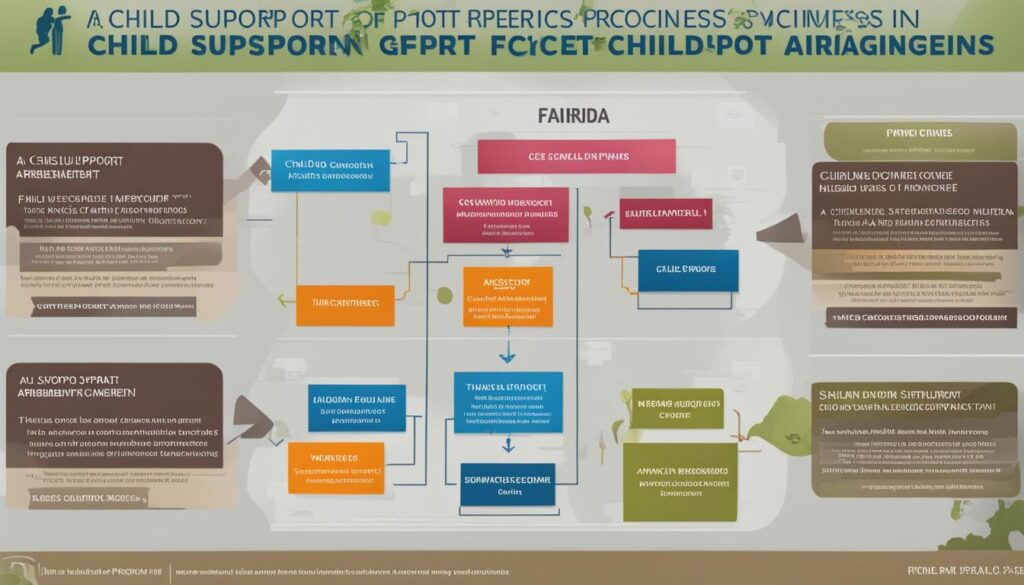Physical Address
304 North Cardinal St.
Dorchester Center, MA 02124
Physical Address
304 North Cardinal St.
Dorchester Center, MA 02124

Navigating child support calculations in Florida can feel like a trek through a legal jungle. But fear not! This guide is your compass.
Imagine yourself in a courtroom, your palms sweaty, your heart racing. You’re about to learn what determines the money that changes hands for your child’s well-being. Florida’s laws have unique twists and turns, making it a bit of a puzzle.

We’ll break down the key factors, from income brackets to parenting time. You might be wondering, “Will the court consider my specific situation?” Absolutely. Every dollar counts in raising a child, and Florida knows it.
Keep reading to unravel the mystery of child support calculations in the Sunshine State. Your peace of mind is just a few paragraphs away. Ready to dive in? Let’s get started.
When it comes to determining child support payments in Florida, various factors come into play. These include the income of both parents and the number of children involved. Florida follows a specific formula that takes these factors into account to calculate child support.
To estimate child support payments, you can use the Florida Child Support Calculator. This online tool considers income, custody arrangements, and other relevant factors to provide an approximation of the amount you may be required to pay or receive for child support.
While the calculator can give you an idea of what to expect, the court has the final authority to determine the exact amount of child support based on the specific circumstances of your case.
Get a more in-depth overview here of how much is child support.

Calculating child support in Florida involves a specific process outlined in the Florida Child Support Guidelines. This process ensures that child support payments are based on the financial situation of both parents and the needs of the child.
The calculation begins by determining the net income of each parent. Net income includes wages, salaries, commissions, bonuses, and other sources of income, minus certain deductions such as taxes and health insurance premiums.
Once the net incomes of both parents are determined, they are combined to calculate the basic monthly child support obligation. The Florida Child Support Guidelines provide a standardized chart that matches the combined income with the number of children to establish the initial child support amount.
The next step is to determine each parent’s percentage of responsibility based on their individual net incomes. This percentage reflects each parent’s share of the total child support obligation.
Finally, the final child support amount is divided between the parents based on their percentages of responsibility. The parent with the higher percentage of responsibility will typically pay a larger portion of the child support amount.
While the Florida Child Support Guidelines provide a framework for calculating child support, the court may deviate from these guidelines if there are special circumstances that warrant it. The ultimate goal is to ensure that child support payments are fair and in the best interest of the child.
When determining the amount of child support in Florida, several factors come into play. These factors can influence the final child support amount and ensure that it is fair and reflective of the financial circumstances of both parents.
The primary factor considered is the income of both parents. This includes not only their regular salaries but also any bonuses, commissions, or other sources of income. The court takes into account the total income of both parents to determine the level of financial support that should be provided for the child.
In addition to income, other key factors are taken into consideration. Health insurance costs, daycare expenses, and taxes can all impact the child support calculation. The court looks at these expenses to ensure that they are accounted for and appropriately allocated between the parents.
The number of children involved in the case is also a critical factor. The child support guidelines in Florida incorporate a scale that accounts for the needs of multiple children. The more children involved, the higher the child support amount tends to be.
While the child support guidelines provide a framework, the court has the discretion to deviate from these guidelines if there are special circumstances that warrant it. Each case is evaluated on its own merits, and the court takes into consideration all relevant factors to ensure a fair outcome for both the child and the parents.
Child support is intended to cover the basic needs of the child, including food, clothing, and shelter. However, it also extends beyond these essentials to encompass other important expenses that contribute to the child’s well-being and development.
The specific items covered by child support may vary depending on the needs of the child and the agreement reached by the parents or the court. Open communication and a mutual understanding between parents are crucial in determining how child support funds are allocated to meet the child’s needs and provide for their overall well-being.

Child support in Florida is an essential component of divorce and custody cases. The court orders child support based on specific guidelines and the unique circumstances of each case.
The process involves determining the amount of child support and enforcing regular payments to ensure the well-being of the child.
When determining child support in Florida, the court considers various factors, including the income of both parents, the number of children, healthcare expenses, and daycare costs.
Based on these factors, the court calculates the child support amount, which is considered the presumptive amount.
Once the court establishes the child support obligation, the parent responsible for making payments is required to fulfill their financial responsibilities.
Typically, child support payments are made directly to the other parent or to the state child support agency. It is essential to adhere to the payment schedule and meet the obligations outlined in the court order.
The Florida Child Support Guidelines serve as a comprehensive framework for calculating child support payments in the state. These guidelines take into account various factors, including the income of both parents, the number of children involved, and other relevant considerations.
The primary objective of these guidelines is to ensure that child support payments are fair and based on the financial capacity of the parents.
Under the Florida Child Support Guidelines, the court utilizes a specific formula to determine the amount of child support. This formula considers the combined income of both parents and establishes a basic monthly child support obligation.
The parents’ respective contribution percentages are then determined based on their individual incomes. The final child support amount is allocated between the parents, taking into account their percentages of responsibility.
While the Florida Child Support Guidelines provide a starting point for child support calculations, the court does possess some discretion to deviate from these guidelines in certain cases.
Such deviations may occur when special circumstances arise that warrant an adjustment to the standard calculation. This flexibility allows the court to address unique situations and ensure that child support amounts are appropriate and equitable.
By following the Florida Child Support Guidelines, parents and the court can achieve a fair and consistent approach to determining child support obligations. These guidelines provide clarity and transparency, allowing for greater predictability and fairness in child support calculations.

Child support is generally mandatory in Florida. Both parents are generally required to provide financial support for their children. The specific amount of child support will depend on the income of the parents and the number of children.
Failure to pay child support can result in legal consequences, such as fines or even jail time. It is important for parents to understand their obligation for child support and fulfill their responsibilities.
Child custody plays a significant role in the calculation and payment of child support. When parents separate or divorce, the court usually designates one parent as the primary custodial parent, while the other parent is granted visitation rights or shared custody.
The parent with primary custody of the child typically receives child support payments from the other parent. The amount of child support may be influenced by the parenting time and responsibilities of each parent.
For example, if one parent has more parenting time or takes on a greater share of the child’s financial needs, they may receive higher child support payments to ensure the child’s well-being.
When determining the child support amount, the court will consider the custody arrangement. Factors such as the number of overnights each parent has with the child, their respective incomes, and the child’s needs will be taken into account. The goal is to ensure that the child’s financial needs are met by both parents in a fair and equitable manner.
| Key Points |
|---|
| The parent with primary custody usually receives child support payments. |
| Parenting time and responsibilities can influence the amount of child support. |
| The court considers the custody arrangement when determining child support. |
| Understanding the impact of child custody on child support is crucial for parents. |

Child support orders in Florida can be enforced through various mechanisms. If the other parent fails to make the required payments, it is important for parents to know their rights and options for enforcing child support orders.
The state child support agency can assist in enforcing child support orders and collecting payments. They have the authority to implement enforcement measures to ensure compliance.
Some of these enforcement measures include:
If you are facing difficulties in enforcing child support orders, seeking legal assistance may be beneficial. An attorney can guide you through the process and provide support and representation in court if necessary.
Child support orders in Florida can be modified or adjusted under certain circumstances. If there has been a substantial change in circumstances, either parent can request a modification.
These changes may include a significant change in income, a change in the parenting schedule, or a change in the child’s needs.
The court considers the requested modification and makes a decision based on the best interests of the child. Parents should follow the proper legal process if they need to modify or adjust their child support order to ensure a fair and appropriate outcome.
| Reasons for Child Support Modification | Examples |
|---|---|
| Income Change | If a parent’s income significantly increases or decreases |
| Parenting Schedule Change | If there are substantial changes to the custody or visitation schedule |
| Childcare or Medical Expenses | If there are significant changes in the child’s healthcare or childcare needs |
| Education Expenses | If the child’s educational needs and expenses change significantly |
When it comes to child support and taxes, there are several important considerations that parents should be aware of. Understanding the tax implications of child support can help ensure proper financial planning and compliance with tax laws.
First and foremost, child support payments are not tax-deductible for the paying parent. This means that the parent who is responsible for making child support payments cannot claim them as a deduction on their tax return.
On the other hand, the parent receiving child support does not need to report these payments as income for tax purposes. Child support is considered nontaxable income, which means it does not need to be included on the recipient’s tax return.
Also, note that child support payments do not have any impact on the tax filing status or tax liability of either parent. Child support is separate from the tax responsibilities of the parents, and it does not affect their tax situation in any way.
If you have any specific questions or concerns regarding the tax implications of child support in Florida, it’s advisable to consult with a tax professional. They can provide personalized guidance based on your individual circumstances and help ensure compliance with relevant tax laws.
Child support in Florida typically ends when the child reaches the age of majority (18) or graduates from high school. However, there may be additional provisions in the child support order for college expenses.
Parents can include a provision in the child support order to address the child’s college education expenses. The specific details and requirements for college support will depend on the individual circumstances and the agreement reached by the parents or the court.
| Child Support for College Expenses | Paying for College with Child Support |
|---|---|
| Parents can include provisions in the child support order for college expenses. | Child support can be used to pay for tuition, books, and other college-related costs. |
| Specific details and requirements for college support vary based on individual circumstances. | Parents should consult with legal professionals to ensure the child’s college expenses are appropriately addressed in the child support order. |
| College support provisions can outline payment terms and responsibilities. | Child support payments can help alleviate the financial burden of college for the custodial parent. |
In Florida, child support typically continues until the child reaches the age of majority or graduates from high school. This means that parents are legally obligated to provide financial support for their child until they turn 18 or complete their high school education.
However, there are exceptions to this general rule. If the child has a disability or special needs that require ongoing support, child support payments may continue beyond the age of majority or graduation from high school. In such cases, the court may order the continuation of child support to ensure that the child receives the necessary care and assistance.